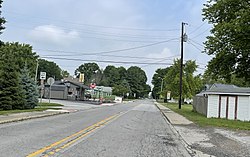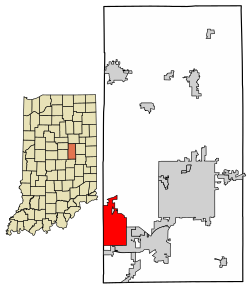Lapel is a town in Stony Creek and Green townships, Madison County, Indiana, United States. It is part of the Indianapolis–Carmel–Anderson metropolitan statistical area. The population was 2,325 at the 2020 census,[3] up from 2,068 in 2010.
Lapel, Indiana | |
|---|---|
 Lapel in 2022 | |
 Location in Madison County, Indiana | |
| Coordinates: 40°02′00″N 85°50′26″W / 40.03333°N 85.84056°W | |
| Country | United States |
| State | Indiana |
| County | Madison |
| Townships | Stony Creek, Green |
| Area | |
• Total | 10.37 sq mi (26.85 km2) |
| • Land | 10.37 sq mi (26.85 km2) |
| • Water | 0.00 sq mi (0.00 km2) |
| Elevation | 856 ft (261 m) |
| Population | |
• Total | 2,325 |
| • Density | 224.23/sq mi (86.58/km2) |
| Time zone | UTC-5 (Eastern (EST)) |
| • Summer (DST) | UTC-4 (EDT) |
| ZIP code | 46051 |
| Area code | 765 |
| FIPS code | 18-42228[4] |
| GNIS feature ID | 2396708[2] |
| Website | www |
History
editLapel was platted in 1876 by David Conrad and Samuel Busby when the railroad was extended to that point. The name "Lapel" was chosen because the railroad caused the town to be in the shape of a man's coat lapel.[5][6]
Geography
editLapel is located in southwestern Madison County. It is bordered to the south by the town of Ingalls, to the southeast by the town of Pendleton, and to the north by unincorporated Fishersburg.
Indiana State Road 13 passes through the center of Lapel as Pendleton Avenue, leading south 9 miles (14 km) to Fortville and north 15 miles (24 km) to Elwood. State Road 32 runs along the northern border of the town, leading east-northeast 9 miles (14 km) to Anderson, the county seat, and west-southwest the same distance to Noblesville. State Road 132 leads southeast from Lapel 7 miles (11 km) to the center of Pendleton.
According to the U.S. Census Bureau, Lapel has a total area of 10.37 square miles (26.9 km2), all land.[1] Stony Creek passes just north of the town limits, leading southwest to the White River in Noblesville, while Mud Creek rises as several small headwaters in the undeveloped southern part of the town, flowing southwest to Fall Creek in Lawrence.
Demographics
edit| Census | Pop. | Note | %± |
|---|---|---|---|
| 1900 | 869 | — | |
| 1910 | 1,045 | 20.3% | |
| 1920 | 1,079 | 3.3% | |
| 1930 | 1,140 | 5.7% | |
| 1940 | 1,146 | 0.5% | |
| 1950 | 1,389 | 21.2% | |
| 1960 | 1,772 | 27.6% | |
| 1970 | 1,796 | 1.4% | |
| 1980 | 1,881 | 4.7% | |
| 1990 | 1,742 | −7.4% | |
| 2000 | 1,855 | 6.5% | |
| 2010 | 2,068 | 11.5% | |
| 2020 | 2,325 | 12.4% | |
| U.S. Decennial Census[7] | |||
2010 census
editAs of the census[8] of 2010, there were 2,068 people, 803 households, and 578 families living in the town. The population density was 1,498.6 inhabitants per square mile (578.6/km2). There were 850 housing units at an average density of 615.9 per square mile (237.8/km2). The racial makeup of the town was 97.7% White, 0.2% African American, 0.3% Native American, 0.2% Asian, 0.3% from other races, and 1.3% from two or more races. Hispanic or Latino of any race were 0.8% of the population.
There were 803 households, of which 38.9% had children under the age of 18 living with them, 53.3% were married couples living together, 13.8% had a female householder with no husband present, 4.9% had a male householder with no wife present, and 28.0% were non-families. 23.3% of all households were made up of individuals, and 10.3% had someone living alone who was 65 years of age or older. The average household size was 2.58 and the average family size was 2.99.
The median age in the town was 37.3 years. 27.9% of residents were under the age of 18; 7.5% were between the ages of 18 and 24; 26.2% were from 25 to 44; 25.9% were from 45 to 64; and 12.4% were 65 years of age or older. The gender makeup of the town was 48.3% male and 51.7% female.
2000 census
editAs of the census[4] of 2000, there were 1,855 people, 749 households, and 534 families living in the town. The population density was 2,421.5 inhabitants per square mile (934.9/km2). There were 788 housing units at an average density of 1,028.6 per square mile (397.1/km2). The racial makeup of the town was 98.87% White, 0.05% African American, 0.27% Native American, 0.05% Asian, 0.05% Pacific Islander, 0.16% from other races, and 0.54% from two or more races. Hispanic or Latino of any race were 0.43% of the population.
There were 749 households, out of which 34.6% had children under the age of 18 living with them, 55.3% were married couples living together, 12.8% had a female householder with no husband present, and 28.6% were non-families. 26.0% of all households were made up of individuals, and 11.9% had someone living alone who was 65 years of age or older. The average household size was 2.48 and the average family size was 2.96.
In the town, the population was spread out, with 27.5% under the age of 18, 7.9% from 18 to 24, 30.9% from 25 to 44, 21.1% from 45 to 64, and 12.6% who were 65 years of age or older. The median age was 35 years. For every 100 females, there were 94.2 males. For every 100 females age 18 and over, there were 86.7 males.
The median income for a household in the town was $41,389, and the median income for a family was $48,083. Males had a median income of $38,854 versus $24,727 for females. The per capita income for the town was $18,887. About 4.8% of families and 5.7% of the population were below the poverty line, including 7.7% of those under age 18 and none of those age 65 or over.
Education
editLapel contains an elementary school, a junior high school and a high school. A new high school building was finished in December 2007. Lapel schools are a part of the Frankton-Lapel School Corporation in central Madison County.
Lapel has a public library, a branch of the Anderson Public Library.[9]
References
edit- ^ a b "2022 U.S. Gazetteer Files: Indiana". United States Census Bureau. Retrieved April 11, 2023.
- ^ a b U.S. Geological Survey Geographic Names Information System: Lapel, Indiana
- ^ a b "P1. Race – Lapel town, Indiana: 2020 DEC Redistricting Data (PL 94-171)". U.S. Census Bureau. Retrieved April 11, 2023.
- ^ a b "U.S. Census website". United States Census Bureau. Retrieved January 31, 2008.
- ^ Forkner, John La Rue; Dyson, Byron H. (1897). Historical Sketches and Reminiscences of Madison County, Indiana. Wilson, Humphreys & Co. p. 955.
- ^ Forkner, John La Rue (1914). History of Madison County, Indiana: A Narrative Account of Its Historical Progress, Its People and Its Principal Interests, Volume 1. Lewis Publishing Company. p. 128.
- ^ "Census of Population and Housing". Census.gov. Retrieved June 4, 2015.
- ^ "U.S. Census website". United States Census Bureau. Retrieved December 11, 2012.
- ^ "Hours and locations". Anderson Public Library. Retrieved March 10, 2018.